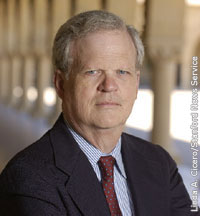 Phi Beta Kappa Visiting Scholar James Sheehan, the Dickason Professor in the Humanities at Stanford, will discuss "Why the European Union Will Not Become a Superpower" on Monday, Feb. 11 at the Marian Miner Cook Athenaeum. The public portion of the program begins at 6:45 p.m. There is no charge and seating is on a first-come basis.
Phi Beta Kappa Visiting Scholar James Sheehan, the Dickason Professor in the Humanities at Stanford, will discuss "Why the European Union Will Not Become a Superpower" on Monday, Feb. 11 at the Marian Miner Cook Athenaeum. The public portion of the program begins at 6:45 p.m. There is no charge and seating is on a first-come basis.
Sheehan began teaching modern European history at Stanford in 1979 and is a senior fellow of the Institute for International Studies, and the Paul Davies Family University Fellow in Undergraduate Education.
With attention to last year's celebration by the European Union of 50 years of peace and prosperity, Sheehan's address examines the history of Europe in the 20th century, and suggests why political integration is unlikely and may be undesirable. Despite the Union's accomplishments, many Europeans are noted to feel that integration has somehow failed, that the Union will not be complete until it looks more like a federal statewith a constitution, unified foreign policy, and defense capacity.
Sheehan is the recipient of four teaching awards, a Guggenheim fellowship, a Humboldt Research Prize, and an NEH fellowship. His books include The Eclipse of Violence: The Transformation of Twentieth-Century Europe (forthcoming), Museums in the German Art World: From the End of the Old Regime to the Rise of Modernism (2000), German History, 1770-1866 (1993), and German Liberalism in the Nineteenth Century (1978). President of the American Historical Association in 2005, he is a fellow of the American Academy of Arts and Sciences and the American Academy in Berlin, a corresponding fellow of the Royal Historical Society, and a member of the American Philosophical Society and the Orden pour le M?rite.
Sheehan earned his bachelor's degree from Stanford, and his master's and doctorate degrees from the University of California, Berkeley.
Founded in 1776, Phi Beta Kappa is the nation's oldest academic honor society, with chapters at 276 colleges and universities, and more than 600,000 members, including CMC's Tau of California. The Visiting Scholar Program contributes to the intellectual life of member institutions by making available distinguished scholars who visit colleges and universities with chapters of Phi Beta Kappa.
James Sheehan to Discuss
History of European Union
